And Here She Would Rest
March 15, 2003
Dunlaw House
God Made Grandmothers Ö
To listen and care,
And hear a childís simple prayer;
To read stories and take time
For nonsense and rhyme.
He made grandmothers Ö
To laugh and chase sad times away,
To mend dreams that are broken,
And to brighten the day;
God made grandmothers special Ö
Like angels above;
To guide us and help us,
But mostly, to love!
(A card of my mothers, By Rebecca Barlow Jordan)
After breakfast, Nan and I
began the day by planning a trip to town to get flowers for Grannyís
graveside service. Our bed and breakfast host, Barbara, offered us a lift
and we gratefully accepted.
My mother was proud to
claim her Welsh heritage and, in honour of her Welsh father, a submarine
pioneer who entered into "boy service" in the Royal Navy when he was about
twelve years old rather than go down to work in Llanelliís mines, and who
was killed ten days before the Great Warís armistice, Mother took me
annually to Remembrance Sunday Services held every year on the Cressy. For
her and her father, I had the florist put together a bouquet of daffodils
and anemones, her favourite flowers. In full bloom, those bright red
flowers resembled poppies for her father. The florist also had some nice
cultured thistles, and I had her add some gypsum, too, because it reminded
me of the gorse of the Sidlaws from our many walks there. Along with some
carnations in memory of trips to the "gardens" at the foot of the Law to
buy flowers and vegetables, these little remembrances made a nice tribute
for her Dundee life and the love she gave me. We added a few mixed flower
bouquets for those already lying at rest in the plot. I felt we had done
well.
Nan must really like her
exercise because she took me on a tour up to the West Port (prompting me
to tell her the story of Bonnie Dundee, both the man and the song, along
with a sampling of Covenanter/Jacobite history, 1689 Rebellion,
Killiecrankie and Bonnie Dundeeís death there). She showed me where she
and Stephanie got themselves lost last night. I told her that in my day, I
would have avoided the West Port at night, even though I had from the time
I was 15 till I was 17 worked during the Christmas holidays in a
haberdasher and toy shop right at the foot of the Hawkie, or Hawkhill.
Once I explained to her
what a haberdasher was, Nan said they did fine except when it came to
trying to cross the street at the "roundabout." I had read on the web
about the joys of driving round these traffic delights, and therefore had
chosen that my family and I would be walkers instead of drivers. Well,
apparently, so much for another of my great ideas.
We got back to Dunlaw
House, after another nice walk up the Conshie, in plenty of time for Steve
Mackie, from Rowan Executive Travel, to pick up us up to get on over to
the Church at Bingham Terrace.
Steve picked us up in
plenty of time. When we teased him about being early, he told us he came
early because his last funeral was two or three weeks ago for his mother
in law. Seems he went to the wrong place, and thought he was early at the
right place since he was the only person there. He thought that was
unusual, but was, to use my motherís word, "chuffed" that he was there to
greet folks. But, in reality, by the time he figured out nobody was
showing up because he was in the wrong location, and made a mad dash to
where the services were, he arrived last and almost missed the funeral.
He tells me his wife at
last saw the humour in the situation and has forgiven him Ė but I told him
it were me Iím sure I could milk this sort of thing for a very long time!
I didnít realize our church
building was almost touching the walled grounds of the Eastern Cemetery,
once a fairly exclusive cemetery for the well to do, which we certainly
werenít. I now understand how much emphasis my family must have had on
showing respect for the dead when they bought two side by side cemetery
plots there. We passed headstones of jute managers, town councilmen, and a
high commissioner for Ceylon on the way to our plot.
Part of me wants to say my
mother and family are resting in good company; part of me wants to just
recognize that death is the final leveler of humanity.
I recognized our plot by
the granite vase holder there that I used to help my mother fill with
flowers for Uncle Eric. I was glad we had a nice selection of flowers for
all our family members there.
Our service was simple.
My mother loved the
McCrimmon version of the Lordís My Shepherd and the two dozen or so of us
who were there, family and friends, not to mourn but to honor my mother
(and Iím not accidentally on purpose quoting Shakespeare Ė it just seems
the right way to put things) sang it beautifully without music.
Ina Clancy, a woman my
motherís age who had known my mother many years of her life, as well as me
and my Granny from when her husband, Dennis, had sung in the variety shows
at the Palace Theater when my Granny then worked in the box office,
offered the opening prayer, expressing love for my mother and appreciation
for knowing her. She acknowledged my motherís love of Scotland and said in
her prayer how wonderful it was that she had come home "where she
belonged" to a final rest with family and friends.
I represented my motherís
family, and said a few words about my motherís sacrifices for me and her
love for her grandchildren and their children. I noted she was "Dundee all
her life" and never stopped saying "eh" for "I" and that she felt
everybody in America had an accent except her. I recounted that it wasnít
unusual for her to get frustrated that Scottish English and American
English were so different, and I saw my children smile. My mum would get
so mad when people would make comments to her about how well she spoke
English! Depending on her mood, sheíd either give these folks a right
telling off, or just lead them on about the hours and the efforts she had
to put in to understanding Americans.
Bishop Campbell, just a lad
when my mother and I were in Scotland and I was a young thing, too, gave a
lovely talk about families, and the resurrection, and the miracle of life
and death from our first breath at birth to our last moment on this earth.
President Clancy, another
bairn Ė younger than me Ė during our time and now a fine man with a
wonderful ability to lead the Church in Dundee, with a beautiful family,
dedicated the grave for my motherís final resting place for her and the
others previously interred there, which was very comforting. He included a
blessing upon us, my motherís family, that we would be safe and draw close
to each other. Very, very comforting at this time and inspiring to me as I
think of the grandmother and mother I want to be now that Iím the head of
this clan.
We had a beautiful day with
a little wind, a sky full of white fluffy clouds in bright sunshine and
warmth and love among reunited friends.
The cemetery representative
gently placed my motherís little casket in the earth and gave a respectful
bow towards her remains. I shall remember this respect for a very long
time. We sang God Be With You Till We Meet Again. And there were tears of
love.
We came back to Dunlaw
House Hotel for the cup of tea that wasnít Ė because no one in attendance
is a tea or coffee drinker Ė and a nice lunch that my mother would have
enjoyed, especially the shortie and strawberry tarts. We had lovely
sandwiches and sausage rolls, and if I had remembered I would have asked
for plenty of "biled ham raw" that my mother always said was funeral fare.
And she would have had that missing cup of tea, Mormon or no!
I think I can best describe
the get together that followed by quoting a few comments from the words
written in my motherís remembrance book that her friends and mine signed
for her today: "Iím glad your motherís back here among us," and "Iím sorry
I didnít get to know Carol as well as Iíd like, but I could certainly keep
you busy for a while telling tales about Charlotte." My mother would have
liked that.
When our guests left, my
older girls decided to go shopping and my little tour group of me and my
two grandchildren remained. I thought Iíd take them to Camperdown Park to
see the Wildlife Park there, but we were in late afternoon by then.
Instead, after a walk Lochee way along by the Berrick Park, we found the
Dundee Circular bus, which took us on an hour long tour around Dundee. I
was able to revisit some of the places Joy had taken us and enjoyed
listening to Xylia give Nathan "the tour" from the Hilltown to the Schemes
then on to the Ferry (Broughty, the place without a ferry and she had fun
confusing him this time) to Blackscroft and back down to the Wellgate. We
got off the bus at Peter Street, behind Markieís pend only partly because
Nathan, who has a tendency towards travel sickness, was starting to look
just a wee bit green.
Our walk then wound our way
along the by now familiar streets of "doon the toon" to Fisher and
Donaldsonís in Crichton Street to have an afternoon tea together (a treat
in my childhood.) Itís a small world, indeed, because our waitress there
was one of the members of the Church who had not been able to attend the
graveside services because she had to work. She said kind words to us that
added another link added to the chain of support.
We started our walk home
towards our beloved Conshie Brae, but passing the taxi stand I changed my
mind, deciding that once a day up the brae is all the exercise I need.
Tomorrow is our first
touring day. Steve has promised us a surprise for lunch. Grannyís gift of
Scotland to her grandchildren will begin soon.
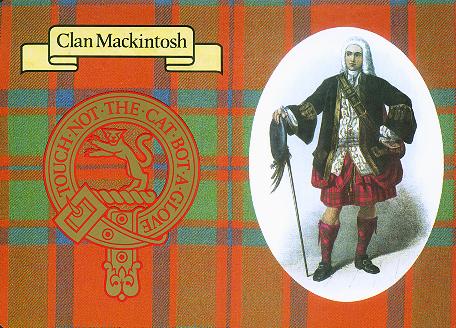
Proud to be a McIntosh
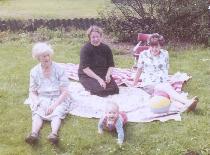
At Symers Street with my
grandmother, me and my son, John, in 1969
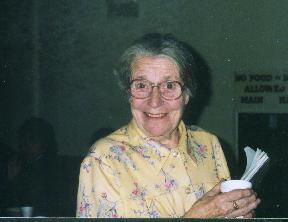
In California in the 1980ís
My Motherís Attitude on Life
Whaís Like US?
Damn Few and Theyíre a Deid!
The average Englishman in
the home he calls his castle, slips into
his national costume Ė a shabby raincoat Ė patented by chemist
Charles Macintosh from Glasgow, Scotland.
En route to his office he
strides along the English lane, surfaced by
John Macadam, of Ayr, Scotland.
He drives an English car
fitted with tyres invented by
John Boyd Dunlop,
Veterinary surgeon of Dreghorn, Scotland
At the office he receives
the mail bearing adhesive stamps invented by
John Chalmers, Bookseller and Printer of Dundee, Scotland.
During the day he uses the
telephone invented by
Alexander Graham Bell, born in Edinburgh, Scotland.
At home in the evening his
daughter pedals her bicycle invented by
Kirkpatrick Macmillan, Blacksmith of
Thornhill, Dumfriesshire, Scotland.
He watches the news on TV,
an invention of
John Logie Baird of Helensburgh,
Scotland,
and hears an item about the
US Navy founded by
John Paul Jones of Kirkbean,
Scotland.
Nowhere can an Englishman
turn to escape the ingenuity of the Scots.
He has by now been reminded
too much of Scotland and in desperation he picks up the Bible, only to
find that the first man mentioned in the good book is a
Scottish King, James VI,
who authorized its translation.
He could take to drink but
the Scots make the best in the world.
He could take a rifle and
end it all but the breech loading rifle was invented by
Captain Patrick Ferguson of Pit fours, Scotland.
If he escaped death, he
could find himself on an operating table injected with penicillin,
discovered by
Sir Alexander Fleming of Darvel, Scotland,
and given chloroform, an
anaesthetic discovered by
Sir James Young, Surgeon, Obstetrician and Gynecologist of Bathgate,
Scotland.
Out of the anaesthetic he
would find no comfort in learning that he was
safe as the Bank of England founded by
William Paterson of Dumfries, Scotland.
Perhaps his only remaining
hope would be to get a transfusion of guid Scottish blood which would
entitle him to ask Ė
"Whaís Like Us?"
Remembering my mother
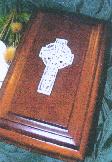

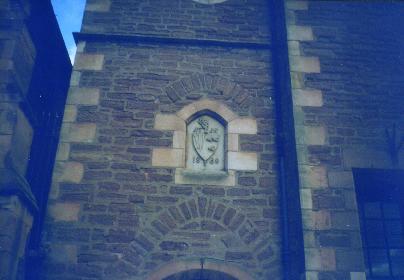
St Salvadorís Church, built 1838
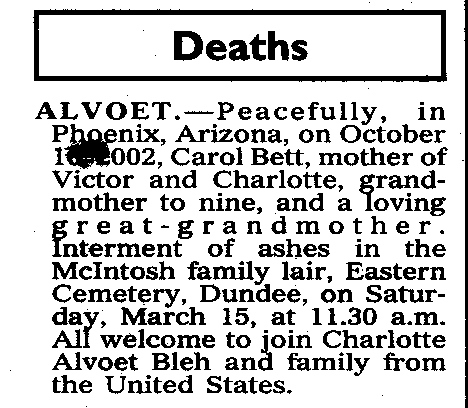
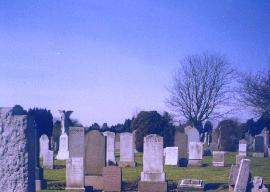
Eastern Cemetery from Lair
MM1489
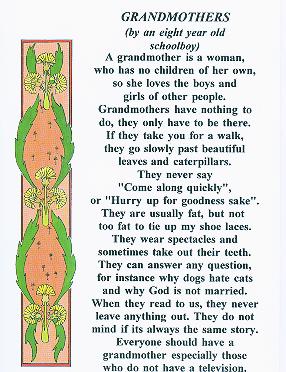
From a card I bought at Greyfriars Kirk, Edinburgh |

